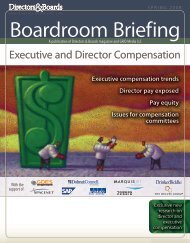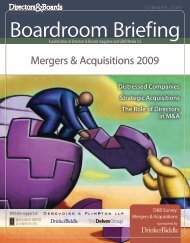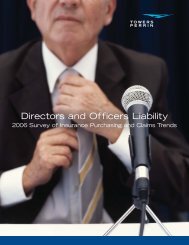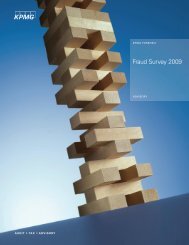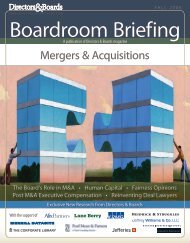The LRN ethics and compliance risk management practices report
The LRN ethics and compliance risk management practices report
The LRN ethics and compliance risk management practices report
Create successful ePaper yourself
Turn your PDF publications into a flip-book with our unique Google optimized e-Paper software.
EXECUTIVE SUMMARY<br />
Increased global competition, economic downturn <strong>and</strong> tighter regulation brought greater<br />
pressure on business <strong>and</strong> with it, greater <strong>risk</strong>. Both companies <strong>and</strong> governments worldwide<br />
had to make adjustments to cope with these changes in the business climate. Our 2008 Risk<br />
Management Practices research <strong>report</strong> shows great awareness of these issues – <strong>report</strong>ing<br />
substantive progress towards building more stringent programs to manage <strong>and</strong> mitigate<br />
<strong>risk</strong>s, as tangible steps were taken to develop <strong>and</strong> nurture a more ethical <strong>and</strong> compliant<br />
business environment – at all levels of the organization.<br />
Governments around the world strengthen their collaboration to legislate <strong>and</strong> enforce a<br />
stricter set of rules regulating many facets of business conduct at a global level. <strong>The</strong> U.S.<br />
<strong>and</strong> European governments tightened their monitoring of potential anti-bribery <strong>and</strong> anticorruption<br />
violations. Companies doing business in the U.S. have had to respond to the new<br />
eDiscovery rule that went into effect in 2007, requiring them to account for <strong>and</strong> maintain all<br />
their internal electronic records including emails, instant messages, <strong>and</strong> electronic documents<br />
that might prove critical in investigations. New European regulations regarding electronic<br />
data privacy <strong>and</strong> data protection have affected companies doing business on the continent.<br />
Moving beyond<br />
<strong>compliance</strong>, more<br />
companies are<br />
conducting culture<br />
assessments.<br />
Faced with this surge of new regulatory <strong>compliance</strong> dem<strong>and</strong>s, as well as fresh ethical<br />
challenges posed by a more complex <strong>and</strong> global business environment, companies<br />
attempted to make necessary adjustments. 2007 brought with it new challenges to the<br />
business world <strong>and</strong> important lessons. Sc<strong>and</strong>als like tainted pet food <strong>and</strong> lead paint in<br />
toys made in China were effective reminders about the need to manage <strong>and</strong> reduce <strong>ethics</strong><br />
<strong>and</strong> <strong>compliance</strong> <strong>risk</strong>s, not only within organizations, but also within their networks of<br />
supplier <strong>and</strong> business partners. <strong>The</strong> meltdown of the mortgage sub-prime <strong>and</strong> banking<br />
industries pushed businesses across all industries to re-examine their internal decisionmaking<br />
processes for the types of conflicts of interest <strong>and</strong> long-term ethical <strong>and</strong> reputational<br />
<strong>risk</strong>s. This correlates with the increase in companies performing a corporate-wide “cultural<br />
assessment”, indicating that they are moving beyond just <strong>compliance</strong> into recognizing that<br />
the entire company culture is at stake.<br />
Our research shows that many companies made good progress in managing their <strong>ethics</strong> <strong>and</strong><br />
<strong>compliance</strong> <strong>risk</strong>s programs by conducting holistic business <strong>risk</strong> assessments, strengthening<br />
each of the five key steps of enterprise <strong>risk</strong> <strong>management</strong> <strong>and</strong> intensifying executive <strong>risk</strong><br />
<strong>management</strong> training.<br />
Increasingly more companies integrate their <strong>ethics</strong> <strong>and</strong> <strong>compliance</strong> <strong>risk</strong> assessments into<br />
their enterprise <strong>risk</strong> <strong>management</strong> process. Also, the vast majority of organizations have<br />
implemented at least some of the best <strong>practices</strong> in terms of defining <strong>and</strong> preventing<br />
<strong>risk</strong>s, detecting violations <strong>and</strong> responding to them. Organizations with mature <strong>ethics</strong> <strong>and</strong><br />
<strong>compliance</strong> functions appear to strongly benefit from their prior efforts, having developed<br />
critical experience <strong>and</strong> skills to assess <strong>risk</strong>s, educate employees, <strong>and</strong> minimize violations.<br />
Organizations with newer <strong>ethics</strong> <strong>and</strong> <strong>compliance</strong> departments <strong>and</strong> those with fewer<br />
resources find themselves still with challenges.<br />
<strong>LRN</strong> | 2008 Ethics <strong>and</strong> Compliance Risk Management Practices Report | 3



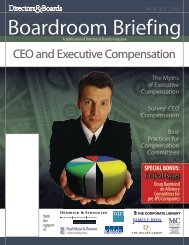
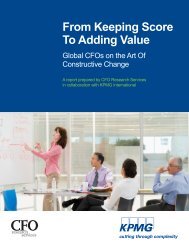
![[link to PDF] for a copy of the briefing paper - Directors & Boards](https://img.yumpu.com/43729022/1/190x245/link-to-pdf-for-a-copy-of-the-briefing-paper-directors-boards.jpg?quality=85)

